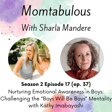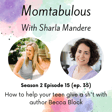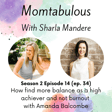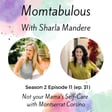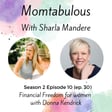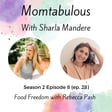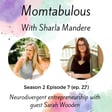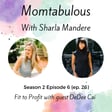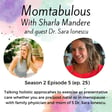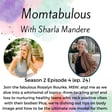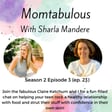Become a Creator today!Start creating today - Share your story with the world!
Start for free
00:00:00
00:00:01

Is it Motherhood or ADHD?
Have you been feeling like your focus is all over the place?
Is it Mom brain, ADHD, Peri-menopause or all of the above?
Join me and Laura Webb, Learning Beyond Letters, a company dedicated to helping neurodiverse students and families radically accept their beautiful brains. Offering parent classes and groups for ADHD and neurodivergent adults, she helps her clients learn to accept their own brains and take control of their own daily routines, thus gaining confidence and self-reliance.
Transcript
Introduction to Guests and Learning Beyond Letters
00:00:00
Sharla Mandere
Hello and welcome back to another episode of Mom Tabulous. I am Charla Mandair and with me today is Laura Webb. Laura graduated magna cum laude from the highly rated University of Tulsa with a degree in speech language pathology and in 2023, Laura founded Learning Beyond Letters, a company dedicated to helping neurodiverse students and families radically accept their beautiful brains. In addition to one-on-one student services now serving the Tulsa, Oklahoma community, Laura offers parent classes and groups for ADHD and neurodivergent adults.
00:00:41
Sharla Mandere
She understands that every brain is unique and now practices radical brain acceptance in her own life. Her clients learn to accept their own brains and take control of their own daily routines, thus gaining confidence and self-reliance.
Realizing Neurodiversity as Adults
00:00:55
Sharla Mandere
I love this so much because we were just talking about how many like adults are finding this like neurodiversity, maybe through their kids being diagnosed or just be realizing like, Oh, I totally have ADHD or yeah, I even there are adults getting diagnosed with like an autism, right?
00:01:13
Sharla Mandere
Where they've just been coping and walking.
00:01:14
Laura Webb
Oh my gosh, yes. Oh my gosh, Charlotte, it's in droves, in droves.
00:01:19
Sharla Mandere
Yeah, it's really, it's really interesting. So walk us through, you have a whole story of how you came into this. And so yeah, tell us about yourself.
00:01:27
Laura Webb
Well, thanks for having me. This is so fun. um I am so happy to be here. I I've been reflecting a lot lately. And, you know, I have been an educational therapist for over 20 years. And I was reflecting on when I first started just tutoring. So I had gone, you know, made it white knuckled it through college and through school, but I really had trouble the whole time. It was that, you know, the deadlines coming. Okay, now I got to get it done. That's how we all that's how we all got through.
00:01:56
Sharla Mandere
detinate like but procrastinate and then pull the all nighter.
00:01:56
Laura Webb
ah yeah And then the all-nighter I was the queen of the all-nighters so And big shout out to the coyotes for letting me oh my gosh the sorority That I loved I wasn't part of it But they just let me study and do those all-nighters with them, and they had old tests and stuff so that way So I mean really
00:01:59
Sharla Mandere
that's what yeah
00:02:10
Sharla Mandere
I love it. I wasn't even part of the sorority, but I totally understand.
00:02:19
Laura Webb
Yeah, I just was like, Can you help me? Yeah. So I mean, we had those those, you know, strategies of completely how do I do this? I need to make friends with these girls. Okay, they seem like they know where they, you know, we had a social strategy. um But you know, before that, I had undiagnosed dialect dyslexia. So ah when I got out of college, I kind of had learned about the brain and language acquisition, because I i got a speech pathology degree in college and undergrad. But after that, I was just like, man, you know, this is this is something that's really difficult for
Pursuing Educational Therapy
00:02:54
Laura Webb
me. um And so i I got my I started tutoring, and I started noticing some of these kids are just like me.
00:03:03
Laura Webb
And, you know, this is a so long ago that I was making like 15 to $17 an hour and also not having any diagnoses for any of these little people. So they would come in, you know, nobody's diagnosed. Everybody's just like, yeah, we have trouble with this. We have trouble with that. So I'm noticing like these little people, they have trouble in one way or another. And some of them look exactly like I did and have some of them feel and I relate to them exactly like my brain.
00:03:33
Laura Webb
Um, and so yeah, just figuring out, went back to grad school and really figured out, I had to tiptoe into that one and really like, like issue with my trauma school, right? Going back to school was like, no, I don't want to, but did it just one class at a time. Um, but yeah, so I got my, uh, degree in educational therapy and there were the answers like, Oh my gosh, thank you. Somebody's finally telling me.
00:03:59
Laura Webb
what the heck was going on with my brain the whole time. So i I really figured out my auditory processing and dyslexic issues and it could not have been cooler to see that and then get trained in how to help dyslexic kids read. So that's what I was doing from the majority of the time, went on do to do, you know, on my on my journey of like, this is amazing. I love helping these kids and I got really good at it. I get really good at helping these kids read.
Challenges of Online Transition and ADHD Diagnosis
00:04:27
Laura Webb
And then, you know, the pandemic hits. And four years ago, I was just like, I cannot do this new schedule because all of a sudden, everything went online. My students are online. My entire business is online. And I'm trying to executive function myself.
00:04:45
Laura Webb
And I was like, there has never been anything harder. And I realized how many systems I had in place, um the body doubling of the office, you know, other people around, I had an office manager and other people to help me do my job, which I love. ah But it was, it's complicated. And there were a lot of systems in place.
00:05:06
Laura Webb
that you know just got erased overnight in March of 2020. So after about six months of that, I was like, I need help. I am not doing well. i you know Just being here, doing my appointments, having to do everything myself. And no one was doing well, obviously.
00:05:26
Laura Webb
like no one No one was doing well. It was a pandemic. But you know there was just a certain way that I was like, I did not know that I was affected in this way. um So I finally got an ADHD diagnosis. And like that was just like, yes, OK, more answers. So I do feel like you know when you get these rec um these big things in your life, these big ahas, you're thankful and also exhausted by it at the same time.
00:05:57
Laura Webb
And like you said, I mean, our kids are getting diagnosed, and then we're reflecting in whatever way that we reflect on our own style of learning.
00:05:57
Sharla Mandere
yeah
00:06:05
Laura Webb
um That's what's interesting, though, is how we're all finding out that we have different brains than we always did, you know?
00:06:15
Sharla Mandere
Yeah. And you know, it's so funny, like this season, I'm talking to so many more guests than last season, and I cannot tell you the amount of women that have said, in March of 2020, it like spurned.
00:06:28
Laura Webb
Well, because we all have like friends and check ins people in our lives and we had systems and yeah, like and it just went away, went away.
00:06:40
Sharla Mandere
And I think there was time.
00:06:40
Laura Webb
Yeah.
00:06:42
Sharla Mandere
There was time to sit and reflect.
Societal Expectations and Neurodivergent Challenges
00:06:44
Sharla Mandere
All of a sudden it was like, we must go, go, go, go, go, go, go, go to stop.
00:06:44
Laura Webb
Hmm. Yeah.
00:06:48
Laura Webb
Yeah.
00:06:48
Sharla Mandere
And I think maybe there was time to be like, oh, okay, the sting.
00:06:54
Laura Webb
Yes.
00:06:54
Sharla Mandere
is actually a thing, right?
00:06:56
Laura Webb
This this is
00:06:56
Sharla Mandere
You know, that the busy, busy goes away, and then, and then there's time to kind of discover yourself. But like, like I was saying, when your brain doesn't turn off, right?
00:07:03
Laura Webb
Yeah. And in the quiet, you're still busy. Still busy up here. Yeah.
00:07:10
Sharla Mandere
Yeah, like I know I, I should probably go get diagnosed, but at this point, I'm 48. So like, I don't know what different makes.
00:07:15
Laura Webb
Well, I always, I think self-diagnosis is completely valid. That's my thing is if you relate to any of the things and you implement the hacks, that's fine. You don't have to, you can relate to it however you want to. You know what I mean?
00:07:29
Sharla Mandere
I mean, the thing that like I would always get in trouble for as a kid, that the I guess the top three things. one you know I was a talker. that And that's not a shock that yeah now my oldest, the report cards come back and it's like, talks too much.
00:07:44
Sharla Mandere
And I'm like, oh yeah, my parents saw that. I even found, like we had this whole thing in the end of middle school with her not turning in the work. She would do the work, but it was like, just turn it in.
00:07:55
Sharla Mandere
Why don't you turn? And she was like, I just forgot. And then I found, when my mom passed away and we were cleaning out the house, she kept all these old report cards.
00:07:58
Laura Webb
Yes.
00:08:04
Laura Webb
Oh my gosh, you got to see them.
00:08:04
Sharla Mandere
am my seventh My seventh grade report card specifically said, if Charla would just turn in her work, she would be great.
00:08:13
Laura Webb
Yeah.
00:08:14
Sharla Mandere
And I was like, oh.
00:08:15
Laura Webb
but
00:08:18
Laura Webb
And see, we call that executive function now. We say, oh, to that seventh grader, we need to learn executive function skills.
Managing ADHD with Strategies and Systems
00:08:25
Laura Webb
But that is that's most of my students now. And what's weird now is it's so digital that it's they don't turn they don't push the turn in button.
00:08:32
Sharla Mandere
Yeah.
00:08:34
Laura Webb
Literally, everything's down to this.
00:08:35
Sharla Mandere
yeah it like
00:08:36
Laura Webb
Don't push the button.
00:08:37
Sharla Mandere
Yeah, well, or it's doing it wrong or whatever. Yeah. So the other thing I was, I was a daydreamer, which, you know, like you just, you're just off in La La Land, all stop daydreaming with focus.
00:08:40
Laura Webb
Right, right.
00:08:44
Laura Webb
Yeah.
00:08:48
Laura Webb
Yeah.
00:08:50
Sharla Mandere
I remember the fingers snapped in my face, focus, focus.
00:08:50
Laura Webb
Yeah. Oh, God. Yeah.
00:08:55
Sharla Mandere
Like, oh, and, um, and then, yeah, I procrastinated and I always had, I, and I still have, if you could see my desk,
00:09:00
Laura Webb
Yeah.
00:09:05
Sharla Mandere
I call it like organized chaos and piles of things.
00:09:07
Laura Webb
The Doom Piles.
00:09:08
Sharla Mandere
And my mom would come in and like move this pile of of papers in my room or it was like mail or even into like college.
00:09:09
Laura Webb
Yeah.
00:09:18
Sharla Mandere
It was just stuff. But I mean, I could tell you what is at the bottom of that pile. I know exactly what is in the pile.
00:09:24
Laura Webb
Yes, I can visualize. Don't touch my stuff.
00:09:27
Sharla Mandere
Do not touch the piles.
00:09:28
Laura Webb
Yeah.
00:09:31
Laura Webb
well and Do you know what a DOOM stands for?
00:09:31
Sharla Mandere
And my mom would be like, just clutter. And I'd be like, no, it's organized.
00:09:39
Laura Webb
I think it stands for Don't Organize Only Move.
00:09:40
Sharla Mandere
No.
00:09:46
Sharla Mandere
OK.
00:09:47
Laura Webb
yeah you never It never gets organized, but it may move around. But the DOOM pile is just that pile that you're like, But that's my pile of that. and you And it can't be moved because it's that thing.
00:09:58
Laura Webb
And so it's not organized, but it is to us.
00:09:59
Sharla Mandere
And I learned Yes, and I learned I learned in adulthood that that's a classic ADHD trait I was like I I still have piles I always and then now my 15 year old I
00:10:01
Laura Webb
It's organized chaos, which is what ADHD is. Yeah.
00:10:16
Sharla Mandere
She has piles of stuff.
00:10:19
Laura Webb
Yeah.
00:10:19
Sharla Mandere
And it's like, even the clothes, the laundry, it's like, this is a pile of clean laundry on the floor that didn't get put away.
00:10:23
Laura Webb
Yeah.
00:10:24
Sharla Mandere
But I know what underwear is in that pile. I know what socks. I know what leggings are in that pile. I have outfits in this pile that I know.
00:10:32
Laura Webb
Yeah. Well, and that's the gift of it is we have this like registrar in our brains that is very like visually calculated. I mean, that is the coolest part about our brains.
00:10:44
Laura Webb
I mean, there's lots of superpowers, as they call them. But there's lots, there's lots, also lots of drawbacks, lots of things that you really need to to take care of.
00:10:48
Sharla Mandere
meet
00:10:53
Laura Webb
And since 2020, I mean, for four years, that's kind of what I've been like, feverishly researching is what are the things that I can do to help my brain in this state? And, you know, we come back to that topic of like self care, but it's so different, right for our brains and and how it works and how we're how we can implement it for ourselves.
00:11:17
Laura Webb
self-care for neurodivergent people is so different.
00:11:18
Sharla Mandere
Yeah.
00:11:21
Sharla Mandere
yeah
00:11:22
Laura Webb
And so like just trying to deal with this new um brain after the whole process of just re-examining your whole life under a different lens, right you you get this information and you're like, okay, there was a reason for not wanting to read the book and then having this explosion of due date of a book report.
00:11:23
Sharla Mandere
Yeah.
00:11:44
Laura Webb
you know, there was a twofold for me, there was a procrastination with ADHD, and then there was I don't want to read that because I have dyslexia, and that sounds terrible. um But you know, when we talk about like, okay, we're accepting our full unbound selves and we're like, this is me. It is what it is. I love myself. i'm I'm not, you know, I'm not wanting to change it, but how do I function in this new life where, you know, I'm, I still am online. I'm still independently contracted and I love doing what I do.
00:12:18
Laura Webb
But it is a lot of independence, a lot of self-starting, a lot of inertia that I have to create every day for myself. And you have to create it for your family. I mean, you're just constantly trying to like create that inertia of like, how do I get things done?
00:12:33
Sharla Mandere
Yeah, totally. And my cat is sitting on my notes.
00:12:35
Laura Webb
Oh, she's so cute!
00:12:41
Laura Webb
Loofies! Oh my gosh, I love gray cats.
00:12:43
Sharla Mandere
Hi.
00:12:45
Laura Webb
They're such a pretty color. So adorable.
00:12:48
Sharla Mandere
Yeah, they call me Blue, which is interesting.
00:12:49
Laura Webb
Oh, okay.
00:12:50
Sharla Mandere
but
00:12:52
Laura Webb
Blue, gray again.
00:12:52
Sharla Mandere
but So she's a blue, but she's gray. um and So, okay.
00:12:55
Laura Webb
Adorable.
00:12:57
Sharla Mandere
So here's the thing too that I feel like, especially with like the focus and ADHD, you know, one of the, you know, I work with women in menopause. And so one of the, or the menopause journey. So perimenopause and menopause.
00:13:07
Laura Webb
Yeah.
Impact of Menopause on ADHD Symptoms
00:13:08
Sharla Mandere
Don't knock over my computer. Okay. um Yeah. Squirrel. um And so, you know, is this this once you have kids, we have baby and it's like mom brain and in this brain fog and now and pause it's menopause brain and it's this brain fog and women are finding this could like the perimenopause journey and this is something I've been looking at a lot lately of like, can it trigger the ADHD almost to like, like an adult onset, right of like,
00:13:18
Laura Webb
in
00:13:38
Laura Webb
Yeah, well, and that's what they're finding. they're They really are finding, like, that And they're debating on whether we call it ADHD or we just call it perimenopause and menopause brain, whatever. I mean, to me, it's like if if that's when you find out that I have a problem with my brain and it's foggy, but it has just started. And it is this is the difference, I think, is if you if you know a start date when you're like, yeah, around the time I turned 40 or 45 or whatever it is, that's when I really started having this
00:14:13
Laura Webb
problem with my brain, it might be hard to actually, you know, calculate that with the pandemic in there, because it was so, you know, differentiated for all of us.
00:14:22
Sharla Mandere
Yeah.
00:14:23
Laura Webb
But um that's the difference is that if it started, and you were like, Yeah, I can pinpoint a time in my life in the in the 40s or so, when my brain got different versus I can look back at my entire life and there are markers of me acting and and living this way. My parents can attest to it. My report cards and teachers can attest to it. There's markers that you can see and it's kind of this aha of like rethinking your entire life through this lens.
00:14:54
Laura Webb
So I think that's the difference is that it's every it's every day of your whole life and you can see it you know when you look back or it's just recently. right so So I think that's how you can tell the difference between, is it onset? But either way, we're still in this now with brain fog. right oh So in their ah they are finding that even prescribing medicine as if you have ADHD can help menopause brain So um whether might you know and I don't know either if mine was got worse because I was around that age and the pandemic hit so um ah About two years ago.
00:15:14
Sharla Mandere
yeah.
00:15:33
Laura Webb
I did get on medicine and I tell you it it is life-changing. I Love it. I mean I'm I'm so grateful for it and whether or not I got on that and because perimenopause, you know, made it worse or not.
00:15:47
Laura Webb
I'm just so thankful to have it. So, you know, the medication journey can can be valid even if it's an onset that's later, you know?
00:15:56
Sharla Mandere
Yeah. Yeah, totally. And you know someone has to decide if the medication is right for them and how how life altering this is.
00:16:01
Laura Webb
Yes.
00:16:03
Sharla Mandere
right For me, I've coped my whole life. So I'm like, well, maybe I'll throw some herbs.
00:16:08
Laura Webb
You're like, this is me.
00:16:10
Sharla Mandere
I'll throw some herbs in there, but I know
00:16:10
Laura Webb
Yeah. hi Yeah, the medication journey is just independent for everybody. Totally.
00:16:16
Sharla Mandere
Yeah, as with as with everything, right?
00:16:16
Laura Webb
Yeah.
00:16:18
Sharla Mandere
But if you feel like it might be something that's helpful to you, then for sure, just like, you know, when we talk about hormone replacement therapy, might even be able to help with that a little bit, right?
00:16:28
Laura Webb
Absolutely.
00:16:28
Sharla Mandere
There's a lot of research now about menopause in the brain and how the brain changes. And so the loss of estrogen and estradiol can affect the way, like just the brain chemistry and what lights up on scans.
00:16:38
Laura Webb
ab Absolutely.
00:16:42
Sharla Mandere
They're starting to scan women's brains and menopause
00:16:42
Laura Webb
Yeah.
00:16:45
Sharla Mandere
just for the purpose of research. And it's fascinating to see what parts of the brain go like black on a scan that used to light.
00:16:53
Laura Webb
Isn't that crazy? And then you're like, I see I'm not crazy. This is actually like a medical.
00:16:59
Sharla Mandere
Yeah.
00:16:59
Laura Webb
Yeah. And then I tell you, I did run out and get some lion's mane mushroom too.
00:17:00
Sharla Mandere
i he
00:17:04
Laura Webb
I heard about those mushrooms. I was like, give me that.
00:17:08
Sharla Mandere
Yes. Yeah. yeah there's so There's so many herbs that are good.
00:17:11
Laura Webb
Yeah.
00:17:11
Sharla Mandere
And I literally feel like this is, and this is just something, maybe this is like, a I'm just spewing stuff out of left field here. wherere we're As we're recording this, it's middle of October, so Halloween's coming, so I've been thinking about this a lot.
00:17:23
Sharla Mandere
like the i'm I'm very curious if there's been research done. I mean, I know they know like with the Salem Witch Trials that it was a lot of like teenagers and older women, and I'm like just curious how many, I know there were lies, right, lies, all someone, but if if a woman spoke too much or a woman had any big emotions, which if you're in Perry, menopause or menopause, or you're a teenage girl and you're getting your peer your hormonal, right, that those emotions were too big for the men and they would go, I'm just curious how many women were burned at the stake,
00:17:49
Laura Webb
Yes.
00:18:02
Laura Webb
Yeah, I would like an examination of all of their brains if we could go back and get great brain scans.
00:18:02
Sharla Mandere
that
00:18:09
Laura Webb
That would be amazing.
00:18:09
Sharla Mandere
Or just tell me their age.
00:18:11
Laura Webb
Yeah.
00:18:11
Sharla Mandere
Just tell me their age.
00:18:11
Laura Webb
Yes.
00:18:14
Sharla Mandere
If you're like, this was a 45 year old woman who really ah ah by all means was like a great neighbor. And then at age, you know, 47 just had had a had a mood swing and then was burned at the stand.
00:18:22
Laura Webb
And then boom. Yeah.
00:18:28
Laura Webb
Well, and that's like even even more recently than that in the 30s, they would lobotomize women.
00:18:28
Sharla Mandere
I would have been so burned.
00:18:35
Laura Webb
I mean, the women are the ones that were I think I mean, I think it was the 30s. Don't quote me on that. But really recently, not just way back into the 1800s, the witch trials, like recently, that is crazy that that is, you know, that they would just frontal lobe lobotomize any woman who was a little too independent, ah not happy with just staying home and, and looking after, you know, the home or just being compliant. I mean, literally, it was just a cure for independence. And they would just cut off the frontal lobe and it would make them docile.
Historical Misunderstanding of Neurodivergence
00:19:12
Laura Webb
So it
00:19:12
Laura Webb
quote unquote worked, right? But I mean, it is wild. that is That is where we're coming from when we're talking about, yes, we get crazy, but can we get some research up in here? I mean, can we get some answers? Because there hasn't been any.
00:19:28
Sharla Mandere
i know I mean, maybe I need to head this research of like, how many women were stuck in a mental institution and burned at the stake that were actually just in menopause?
00:19:35
Laura Webb
Yeah. Yeah. Yeah.
00:19:36
Sharla Mandere
like this
00:19:37
Laura Webb
We want numbers.
00:19:39
Sharla Mandere
and it's also kind of like thank god we're living in 2020 something because Hopefully, hopefully that's not happening right now.
00:19:44
Laura Webb
Yeah. Yeah.
00:19:47
Laura Webb
No more lobotomizing.
00:19:47
Sharla Mandere
We'll see
00:19:48
Laura Webb
Yeah. But this is the thing.
00:19:49
Sharla Mandere
um
00:19:50
Laura Webb
So now we're talking about like, what do we, what do we do? We accept our brains. Okay. We go, okay. Yes, this is happening to me. And you can find out with a, just a hormone paddle, whether whether or not you're in perimenopause or menopause.
00:20:03
Laura Webb
They'll tell you and, uh, whether, you know, you do anything about it through them. You can even do that just at a med spot, you know, get a hormone panel. But, um,
00:20:13
Sharla Mandere
Yeah.
00:20:13
Laura Webb
You know, so.
00:20:13
Sharla Mandere
There's also those tests now, right? It's like a, the hormone tests you can get over the counter. They're like pregnancy where you pee on the stick, but you have to do it over the course of, I think it's like 10 days.
00:20:18
Laura Webb
Yes. Yes.
00:20:24
Sharla Mandere
I did it. I did one of them.
00:20:25
Laura Webb
Yeah, which I think that's more accurate because you go into the med spa and that's one day and I'm like, how are you seeing my you know entire hormone pit?
00:20:30
Sharla Mandere
Yeah.
00:20:33
Laura Webb
Anyway, I was like, I don't understand. So whether you see that or not, right you're like, okay, they tell me that I'm in this thing.
00:20:37
Sharla Mandere
yeah
00:20:42
Laura Webb
you know There's vitamins, there's all this stuff. So yes, you wanna do all those things, but to radically, and this is what I'm trying to say is if you radically accept your brain, then what do we do like to combat all of the brain fog and all of the this is a new existence with you know, you might be taking vitamins and supplements that can help with it. You might be on medication like I am that can help with it. But there's still like a way of functioning in the world that we need to know about right and it changes like everything.
00:21:15
Laura Webb
About how you try to go about your day if you try to go about your day as a total neurotypical you might just get completely burned out and that's what we're seeing is a lot of women that are completely burned out and that's not good because then you know, maybe that is where you get a burned out woman, where they're just like, well, you know, let's just let's just burn her to at the stake.
00:21:29
Sharla Mandere
Yeah.
00:21:39
Laura Webb
Anyway, she's done. um I mean, really, so we're suffering, though. And I think that my whole goal in the last year has been to regulate my nervous system.
00:21:50
Laura Webb
Like how do I live a life where I have a regulated nervous system? And it's not possible to take away all of the stressors and all of the things that come along in life, right? But it is possible to know about your brain and what are the things that I can do to, to regulate my, my nervous system. So, um, you know, there's lots of things, there's tapping, there's breathing, there's somatic movements and somatic therapies, things that you can do like in the moment in your day that's happening, you know, when things are happening, just to like calm yourself, regulate yourself so that it doesn't stick and hold into your body.
00:22:30
Laura Webb
right? And then there's just other things that we have to routines that we have to put in place to when you really, I don't wanna say admit, but when you feel like, okay, I've got this problem.
Importance of Routines for ADHD Management
00:22:41
Laura Webb
So now how do I move forward? And one of those things to me is just don't think that you don't need to write things down. You know, like that one acceptance of like, I need to write things down, literally everything.
00:22:56
Laura Webb
I can't handle any kind of auditory direction. It was already hard for me. That was already something that I learned, right? Auditory directions. I knew that back in college um when I learned what that was.
00:23:09
Laura Webb
But in this state, we need to write things down. And you can't just be like, that's super important. I'll totally remember that. you know There's that that admittance of where we are.
00:23:17
Sharla Mandere
Yeah.
00:23:21
Sharla Mandere
Right. Like how many times have I put something away where I'm like, I know this is going to be here. I'm putting it away right here. So I will remember that it's here.
00:23:28
Laura Webb
Yes, and a special, super special.
00:23:31
Sharla Mandere
And then I like, where did I put it?
00:23:33
Laura Webb
Yeah, it can't have a super special unique hiding place because that does not work. Yes. There there is systems in place, places for things, things go where they go.
00:23:43
Sharla Mandere
Yeah.
00:23:45
Laura Webb
thing Put it back, not...
00:23:46
Sharla Mandere
Like, Yeah, gone for like doesnt say God forbid, I walk in the house distracted and I drop my keys somewhere random.
00:23:49
Laura Webb
Go ahead. Sorry.
00:23:55
Laura Webb
Oh my God.
00:23:55
Sharla Mandere
ah did that i find them
00:23:56
Laura Webb
Done for.
00:23:57
Sharla Mandere
<unk>s have to go on the thing or I'm like freaking out where are my keys I gotta leave I'm running late where are my keys and I and and I've got the whole family searching for mom's keys because mom was carrying so many things and the kid walked in the door and the kids were like homework tears and and and I just dropped everything and you know I didn't I wasn't mindful of where I put my keys and now I you know
00:23:57
Laura Webb
Done for. Yes Yeah Yeah But so that it's like that's the that's the repercussion of not being you know, kind of diligent, but it's like, then you get the like, why are you so anal about like where your stuff goes or like where things are.
00:24:34
Laura Webb
And it's like, I'd rather be this way than have the other side of it where we're all screaming and we can't find it, you know, like there, there, you're either one or the other.
00:24:41
Sharla Mandere
and
00:24:44
Sharla Mandere
Yeah.
00:24:45
Laura Webb
oh
00:24:45
Sharla Mandere
With my kids, it's like one shoe. Where is, where is my one shoe? I'm like, I don't, I don't, know my daughter's at my oldest cheerleader and there was but one, one, one game.
00:24:49
Laura Webb
Yes. I don't know.
00:24:56
Sharla Mandere
We couldn't find one pom pom. And I'm like, how do we lose a big shiny green pom pom? How do we lose this? This is huge. We know it's in the house.
00:25:06
Laura Webb
It's probably in a doom pile somewhere.
00:25:06
Sharla Mandere
It's not like under, it's like It didn't fall between the couch cushions. It's too big for that. How do we lose one?
00:25:14
Laura Webb
Right, right.
00:25:15
Sharla Mandere
And it yeah, it was like under something. We found it, but it's like.
00:25:17
Laura Webb
Oh my God. Well, and the other thing I've noticed is that like habit stacking, like you talked about just putting your keys where they go. Like you have to do the habits. Um, and then what I've done recently is just, you know, with the morning coffee, put the vitamins right there.
00:25:27
Sharla Mandere
Yeah.
00:25:34
Laura Webb
Because if we don't take the vitamins or the things that are actually helping our brain, them are lost, right? So that's really important is where and how are you going to take your supplements?
00:25:39
Sharla Mandere
Yeah.
00:25:43
Laura Webb
where Where and how are you going to take your medicines?
00:25:44
Sharla Mandere
Yeah.
00:25:45
Laura Webb
And even with that, I, I, I forget. I mean, I have a system that's really honed and nobody, you know, it's right there, but I have to gamify it. I can't have one of those pill things where you do it ahead of time a week.
00:25:56
Sharla Mandere
Yeah.
00:25:57
Laura Webb
I have to literally stand there while the coffee is going and like, see if I can get all the pills open and into the dish by the time the coffee ends. That's my system. Like it cannot be, you know, easy, quote unquote.
00:26:08
Sharla Mandere
yeah Again, talking piles, I do love my supplements and I have a bunch of supplements and they're all on the counter because if I put them in the cabinet, i am i and my husband's like, the counter, it just looks cluttered.
00:26:18
Laura Webb
Right. No.
00:26:22
Sharla Mandere
Do these have to be here? And I'm like, well, we'll get a basket.
00:26:23
Laura Webb
Yep.
00:26:24
Sharla Mandere
We'll get something that needs to be an eyesight or I'm i'm i'm out.
00:26:25
Laura Webb
What about the... It's foreign.
00:26:29
Sharla Mandere
I'm going to forget.
00:26:30
Laura Webb
Yep. Yeah.
00:26:30
Sharla Mandere
And then I spent all this money on these supplements And I'm not, I'm not, and then I'm not, you know, but the habit stacking is good.
00:26:35
Laura Webb
yeah
00:26:37
Sharla Mandere
That is like when you meet lunch, when, when I lunch, I take these ones. I drink this one.
00:26:41
Laura Webb
yeah Yes.
00:26:41
Sharla Mandere
I after work out, I do this, you know, like it is, it is a habit stacking that if I am not home for lunch, they don't come with me.
00:26:41
Laura Webb
Yes.
00:26:45
Laura Webb
Yes.
00:26:52
Laura Webb
Right? It's so hard because if we move locations, the habits have to come with us. But that is super tough. I mean, when I'm traveling, kind of some things definitely go by the wayside.
00:27:04
Laura Webb
But I mean, that's why though, like if you have a teenage girl, that is, you know, her room kind of looks or anybody actually, any child that has ADHD, you go in their room, it looks cluttered.
00:27:06
Sharla Mandere
no
00:27:17
Laura Webb
And you say, clean it up. They are like, I know where everything is.
00:27:20
Sharla Mandere
Yeah.
00:27:22
Laura Webb
Don't touch it.
00:27:23
Sharla Mandere
Yeah.
00:27:23
Laura Webb
So you have to involve them in the process, you know, to make a little neater because I definitely felt like that, like, Oh my gosh, I know where everything is. Don't touch it. You're going to screw up my system, whatever system it was that worked, you know, for me, but not anyone else because it looks that way.
00:27:40
Sharla Mandere
Yeah. And that's the thing about the ADHD piles, right? Is like my piles don't bother me because it's organized. I know, but your pile is going to drive me crazy.
00:27:46
Laura Webb
Right, right. your wow Right.
00:27:50
Sharla Mandere
I don't know what's in that pile. That pile is chaos.
00:27:52
Laura Webb
Right. So how we coexist?
00:27:54
Sharla Mandere
I don't know what's in that pile.
00:27:55
Laura Webb
I mean, this is the hardest part is like your piles and my piles make, now we're in like a heap.
00:28:02
Sharla Mandere
Yeah. Yeah.
00:28:02
Laura Webb
Yeah.
00:28:02
Sharla Mandere
Yeah.
00:28:03
Laura Webb
Yeah. I think
00:28:03
Sharla Mandere
More than one ADHD female in the house is, is, is.
00:28:08
Laura Webb
it' It's it's tough. Well, and that's the thing is, like, some of us that are on this journey, and it's only been recently, it's like we're having to re parent ourselves with, you know, how do I take care of myself and take care of my brain and give myself the consistency and routines that I have never had, that I never got? I mean, I know I certainly did not get that routine and
Practical Systems for Daily Management
00:28:29
Laura Webb
consistency. So, you know, those things like putting a basket for yourself ah vitamins, I even like um during Um, getting ready to go to bed and waking up in the morning in the bathroom.
00:28:41
Laura Webb
I have two baskets. I might have to double byproducts, but one basket, you go through everything at night. The other basket, you go through everything in the morning. I mean, you just like, I have to sit, have systems like that.
00:28:54
Laura Webb
Otherwise things don't get done. I don't even brush my teeth. I have to put a toothbrush in each basket and just go run through each thing. You know what I mean?
00:29:03
Sharla Mandere
Yeah.
00:29:04
Laura Webb
I mean, it.
00:29:04
Sharla Mandere
Yeah. Like if you're a mom. Go ahead.
00:29:08
Laura Webb
No, I was going to say that that you could definitely do that for your kids too. Go ahead. That would be fabulous.
00:29:13
Sharla Mandere
Yeah.
00:29:13
Laura Webb
Is that what you're going to say?
00:29:15
Sharla Mandere
Well, and I was going to say, if you're a mom that like works, you know, at a job, there are systems and procedures and policies.
00:29:22
Laura Webb
Yes.
00:29:23
Sharla Mandere
in place and maybe things hopefully run pretty smoothly there that we can apply that right to home.
00:29:29
Laura Webb
Yes.
00:29:30
Sharla Mandere
So talk to me about about Squirrel Club. You have Squirrel Club.
00:29:34
Laura Webb
Yeah, I was I love the earlier you said squirrel and I was like, that's where it comes from.
00:29:35
Sharla Mandere
i
00:29:41
Laura Webb
But yeah, so my, my friends and I that relate to each other in this way, whether they've been, you know, diagnosed or not, ah we were like, man, there's, there's some of us that, you know, we're either entrepreneurs or home moms and just,
00:29:57
Laura Webb
On Mondays, we need to meet and go through our schedule. We need to time block, we need to body double in the screen, and we need to figure out what we're going to do for the week and make our to-do list. So I just made up a squirrel club. It's an hour and a half on Mondays, and it's 10 a.m. um Pacific time on Uh, and so it's, it's the first part of it is me going, hi everybody.
00:30:22
Laura Webb
And there's some games and some fun stuff for like 10 minutes and we just say hi. And then it's like, okay, let's get to work. Brain dump. What is it that you need to do for the week? Get it all out of your head because it all just buzzes around in there.
00:30:34
Laura Webb
And we brain dump out onto two lists.
00:30:35
Sharla Mandere
Thank you.
00:30:37
Laura Webb
One is personal. One is, you know, professional, or really you could have as many lists as you want. I have a member that has four lists. It's like, kid, you know, there's there's different lists for different things.
00:30:48
Laura Webb
And she likes to have all four out. And that's fine. But we're brain dumping onto them. And then, you know, we have a little break. And I remind you, and we use the Pomodoro method, which is the 25 minutes of work on and then a five minute break, maybe sometimes less, but we only work for 25 minutes because that's proven to be right, like,
00:31:04
Sharla Mandere
me.
00:31:08
Laura Webb
from the Italian researcher that had a kitchen timer that was literally a tomato. That's why it's called the Pomodoro method is he found out that 25 minutes is good for our brains. So we do that and then we come back and have another work session and that I facilitate some like, really high, you know,
00:31:30
Laura Webb
fun music that is no words because that's the best study music, but just some get shit done music, you know. So we definitely have like all, you know, all 25 minutes. And and I feel like at the end, ah there's also tips and tricks and you get a Google Drive folder full of all kinds of things that I've been researching every week. And there's, you know, gifts at the end. But but I feel like people, you know, women leave with like, I know what I'm doing for the week.
00:31:59
Laura Webb
I know what I'm getting done. I know what I have to do. Whether I have, you know, the energy to do all of it now or maybe put it on some time blocks for later, you can kind of, we talk about like how to deal with low energy days and stuff like that.
00:32:13
Laura Webb
So it's just like a community, but where you get some stuff done too.
00:32:14
Sharla Mandere
Yeah.
00:32:18
Sharla Mandere
I love it. I think the community aspect is gold. I have, I have to have everything on one list. I, I, for lists is like, I don't, I don't pile my lists.
00:32:24
Laura Webb
Me too. so I know. I'm like, that's not how my brain works, but you go, girl. like Yes, in one place.
00:32:31
Sharla Mandere
I have physical piles, but my list is one list. and I can't pile.
00:32:36
Laura Webb
Yeah, because if I have to go like, where is the other list? I don't know. I don't know if I could find it. Yeah.
00:32:42
Sharla Mandere
Nope. And when I worked like in a call, I had, I had sticky notes all over my computer, like call this person back, respond to this email because I need to see it.
00:32:47
Laura Webb
Yes.
00:32:53
Sharla Mandere
If I, even if I wrote it down, they flip the page. It's gone. It's gone.
00:32:57
Laura Webb
But the sticky note is so fun because then you can crumple it up and you did it and you can physically throw it away.
00:32:57
Sharla Mandere
It's out.
00:33:03
Laura Webb
Like that's why sticky notes are amazing. Yeah.
00:33:06
Sharla Mandere
I love checking. I will go back to my list and write something that I just did that wasn't on the list that I just did. I'll put it on the list just so I can check it off.
00:33:14
Laura Webb
Yes.
00:33:14
Sharla Mandere
Because I think it helps me feel like I accomplished.
00:33:17
Laura Webb
Yes.
00:33:19
Sharla Mandere
And then I'm like, oh, I'm adding to my list. I did a thing that wasn't on the list.
00:33:22
Laura Webb
Exactly.
00:33:22
Sharla Mandere
So now it's on the list.
00:33:22
Laura Webb
I did more.
00:33:24
Sharla Mandere
Ask your
Community Support with the Squirrel Club
00:33:25
Laura Webb
And that's the thing is squirrel club is meant to be like, okay, if you're having a low energy day, what do you do? Like what? And just allowing for that, like, hey, we're gonna say that we're allowing for our hormones, we're allowing for these things that we know happen to us, we don't have to be 100% each day.
00:33:25
Sharla Mandere
credit.
00:33:44
Laura Webb
That's not realistic. And in fact, it's probably not going to happen. We'll also have to change our systems probably every three weeks. because we know that once it becomes a habit for us, that's the goal of every neurotypical is to change something into a habit in 21 days.
00:33:59
Laura Webb
For us, we're going to need to change it up every 21 days, right? and And just slightly make it different so that we'll keep with it. So it's just a different way of thinking about it.
00:34:09
Sharla Mandere
Yeah.
00:34:10
Laura Webb
Yeah. Yeah, but I I love doing it for sure like it's it's my favorite time of the of the week I just feel like i'm getting together with my Co-workers, which you know, I just don't have any right now And so it's just it's amazing to have that community when you feel so isolated I think that's what happened when we were talking about the pandemic is we all got very isolated And this is what I need in general.
00:34:12
Sharla Mandere
Yeah. um
00:34:33
Sharla Mandere
Yeah.
00:34:35
Laura Webb
So this is why it happens but um But you can go it's at learning beyond letters.com. And then in the services area, it just is the first thing that comes up to join the squirrel club. And you know, if you message me, um because you listen to this podcast, you can definitely get a time or two to attend for free. And just let me know if you like it. And then we can move on from there.
00:35:01
Sharla Mandere
I love it. That's awesome. Thank you. Yeah, so good.
00:35:03
Laura Webb
Yes.
00:35:04
Sharla Mandere
And this has been so good. So much fun. It's always so much fun talking to you. And I feel like we could keep going and we'll go what we could go off on our tangents.
00:35:11
Laura Webb
I know, we could, our side quests, I call them like, I could, yeah, we could just be here for days.
00:35:19
Sharla Mandere
We could, we could, but I know mom is busy. So thank you so much Laura for being on.
Conclusion: Radical Acceptance and Self-Love
00:35:24
Sharla Mandere
This was this was great. And I just love the conversation about like the neurodivergent brain, figuring out as an adult, knowing how to tell like if we've always been this way or if this is, we need to look at this in perimenopause and being able to, you know, cause happy mom, happy family, right?
00:35:35
Laura Webb
know Oh, totally.
00:35:40
Sharla Mandere
And and just being okay. um the whole Radical brain acceptance. I love that message of just, this this is who you are. And it doesn't, it's not right or wrong.
00:35:50
Sharla Mandere
It's not, you know, a lot of us have felt so different and there's a lot of fears being on our kids in school of of being so different.
00:35:53
Laura Webb
Yes.
00:35:58
Sharla Mandere
So if you can radically accept your brain for just who you are, then that accepts everybody else, your kids included.
00:36:02
Laura Webb
Yes.
00:36:06
Laura Webb
That's it.
00:36:07
Sharla Mandere
And that's such a great, such a great thing. I love it.
00:36:09
Laura Webb
Thank you. I mean, that's the thing is just letting go of that shame. We've all carried around so many traumas and so many shameful moments and things that We didn't even know we're there. And so when you know, it's like you can go, well, this is just my brain, or this is just my brain now. And that's okay too. Like we're moving through it, you know, and we're gonna, we're gonna get through it together.
00:36:32
Sharla Mandere
You love it. I love it so much. Well, thank you so much for being on and I hope people find you and find you on social, right? We're going to link it in the show show notes.
00:36:38
Laura Webb
Yes. Instagram to yep, I'm on all the things all the things i I just kind of put it out there. Different in different ways, but it's all learning beyond letters. Thank you so much for having me to Charlotte is so fun.
00:36:50
Sharla Mandere
Totally.
00:36:54
Sharla Mandere
Thank you. Always, always good talking to you. And we will see you in the next episode.
00:36:55
Laura Webb
this

